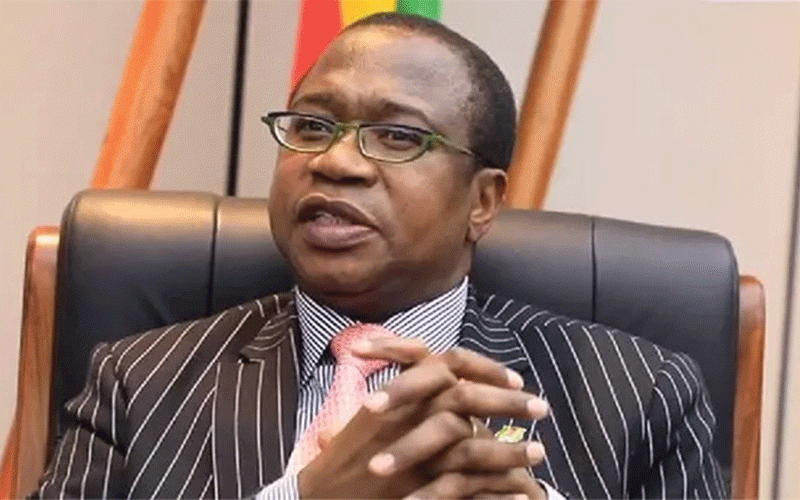
TREASURY says taking over Reserve Bank of Zimbabwe (RBZ)’s external debt will make budget financing for the 2024 fiscal year difficult.
On June 15, President Emmerson Mnangagwa issued Statutory Instrument 108 of 2023 which allowed Treasury to assume RBZ’s external debt.
The reason behind the measure was to prevent the central bank from printing money to service its debt.
However, the assumption of the external debt means that Treasury has acquired $7,69 trillion worth of debt accrued by the central bank between December 31, 2022 and end of May.
Using the exchange rate to convert external debt at the end of 2022, compared to May, the difference between the two is US$51,62 million.
“Government’s financing requirements are expected to remain under pressure during 2024 on account of the takeover of the central bank’s external obligations, growing informalisation and the need to sufficiently provide for NDS1 (National Development Strategy 1) programmes and projects during the medium term,” Finance minister Mthuli Ncube said, in the 2024 budget strategy paper released last Friday.
“However, the government's commitment to maintain the budget deficit within the 3% of GDP (gross domestic product) threshold will be critical in managing inflationary pressures and to restore stability in the economy.”
He said economic growth was expected to remain positive as it was projected at 5,3%, 5,2% and 5% for 2023, 2024 and 2025, respectively, well within the NDS1 growth targets.
- Budget dampens workers’ hopes
- Govt issues $24 billion Covid-19 guarantees
- Letter to my People:They have no answers for Nero’s charisma
- ZMX to enhance farm profitability
Keep Reading
“Government measures in support of macroeconomic stability, coupled with the drive towards structural economic transformation, value addition and beneficiation, are expected to sustain this positive growth trajectory,” Ncube said.
He added that increased electricity generation from the Hwange units 7 and 8 expansion project, as well as investments by independent power producers, were expected to further bolster economic activity during 2024.
“Exchange rate volatility has been a major source of risk in the recent past, affecting revenue collection, expenditures and debt service, particularly for those items denominated in foreign currency. To the extent that exchange rate depreciation feeds into domestic inflation, thus generates pressure on prices on the budget,” Ncube said.
“In the absence of policy interventions, a one percent depreciation of the Zimbabwean dollar against the US dollar widens the fiscal deficit by about 0,1% of GDP. To mitigate the risk, the government has adopted various stabilisation measures including the weekly wholesale of foreign currency to commercial banks.”
He said major risks to the 2024 growth prospects were various macroeconomic factors and climate change-related problems including growing economic informalisation, commodity price volatility, a less favourable rainfall season, expenditure rigidities, and contingent liabilities.
“Revenue collection risks may emanate from reduced tax compliance and transfer pricing, particularly in mining. This risk is further compounded by rising dollarisation, which is shrinking the tax base and promoting informalisation,” Ncube said.
“Full dollarisation has the potential to reduce the taxable base by almost 25%. In order to mitigate the impact, the government is implementing measures to boost the use of the Zimbabwean dollar in domestic transactions.”
He said structural budget rigidities and limited fiscal space were mainly on account of the rising wage bill in relation to other expenditures.
“The wage bill to revenue ratio has risen from 35% in 2020 to around 48,6% of revenue, well above the NDS1 target. This is further compounded by increasing commitments of foreign currency-denominated expenditures that are now crowding out expenditures for critical social sectors and infrastructure development,” Ncube said.
He said there would be limited budget flexibility next year owing to challenges facing budget financing.
“The projected revenue for the year 2024 is $30,7 trillion against expenditures of $33,1 trillion, resulting in a budget deficit of $2,3 trillion (1,5% of GDP),” he said.
The Treasury boss did promise, however, to implement a value for money programme on public procurement, increase transparency over the wage bill, stick to the approved budget, cash budgeting, and institute penalties for over expenditures.
Ncube added that Treasury would prioritise the completion of ongoing projects and monitor payments in foreign currency.
Public debt rose by 5,1% to US$18,02 billion in 2022 as the Zimbabwe dollar lost more than half of its value.
Currently, public debt is estimated at well over US$20 billion.
Ncube said exchange rate volatility was a major risk to 2024 growth.











